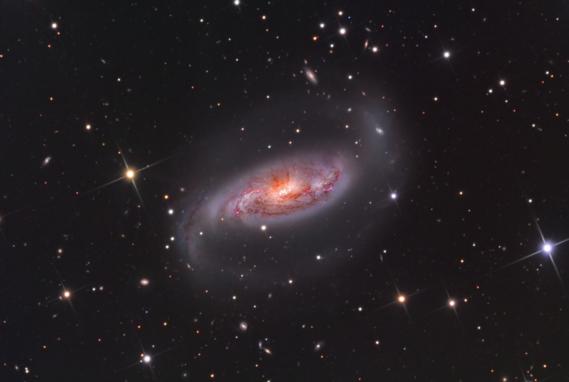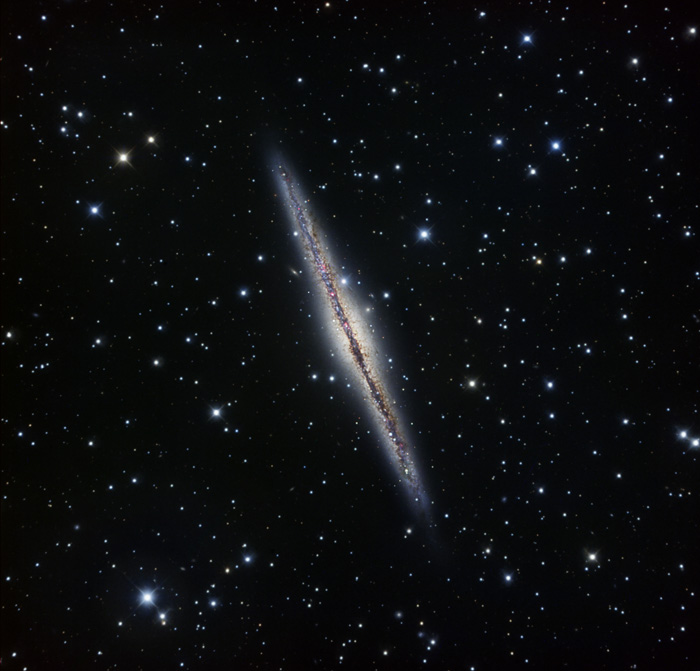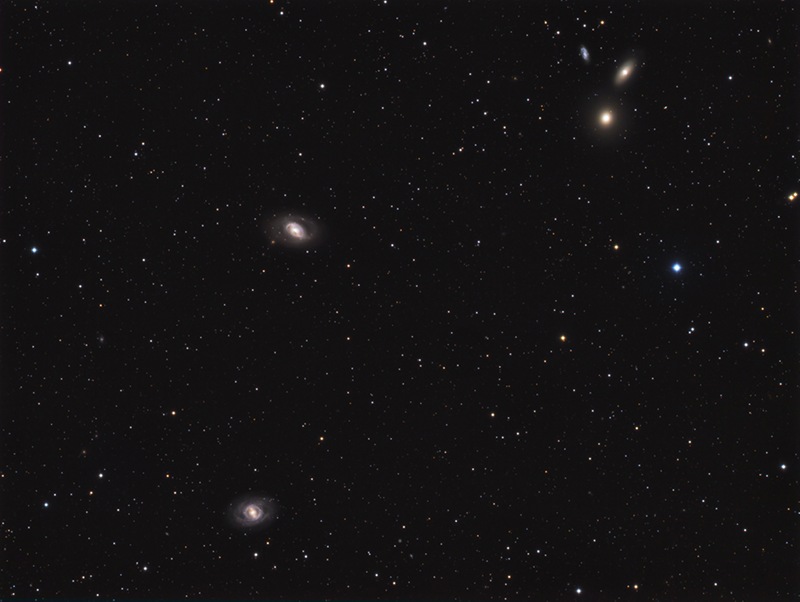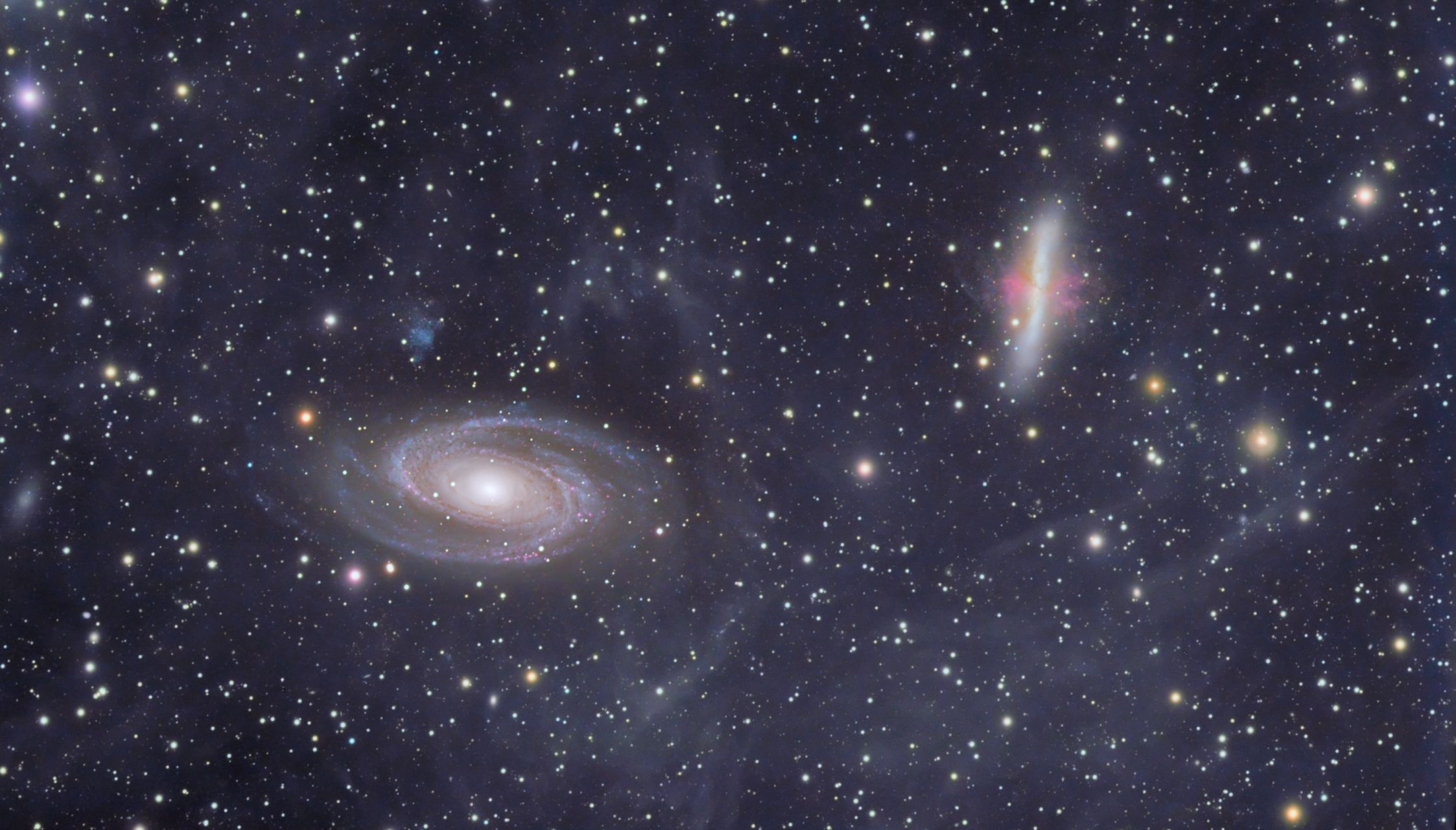Recent Submissions: 2011 March 26-31
Recent Submissions: 2011 March 26-31
________________________________________________________________________________________
Please post your images here.
Please see this thread before posting images; posting images demonstrates your
agreement with the possible uses for your image.
Thank you!
_______________________________________________________________________________________
<- Previous submissions
Please post your images here.
Please see this thread before posting images; posting images demonstrates your
agreement with the possible uses for your image.
Thank you!
_______________________________________________________________________________________
<- Previous submissions
A closed mouth gathers no foot.
Re: Recent Submissions
Rising Selene Behind the Poseidon's Temple
Copyright: Dimitris Kapetanakis
[attachment=3]IMG_1945_resize.jpg[/attachment]
NGC 1760: Star-forming Complex in the Large Magellanic Cloud
http://ryanhannahoe.nmskies.com/?p=380
Copyright: Data acquired by Ryan M. Hannahoe; data processed by Robert Gendler Mercury and Jupiter
http://www.kaasts.com
Copyright: Zain Ahmed
[attachment=2]Mercury at GEE with Jupiter.jpg[/attachment]
Solar Eruption
http://www.makina.it
Movie here: http://dl.dropbox.com/u/1094920/ASTRO/S ... iretto.avi
Copyright: Alberto Mayer
[attachment=1]110321-Flare.jpg[/attachment]
Milky Way over La Palma
http://www.elcielodecanarias.com
Copyright: Daniel López
[attachment=0]La_Palma_Lactea_DLopez.jpg[/attachment]
NGC 1808: Seyfert Galaxy in Columba
http://www.starshadows.com/gallery/disp ... ?imgID=416
Copyright: Steve Mazlin, Jack Harvey, Rick Gilbert, and Daniel Verschatse (SSRO/PROMPT/CTIO)
Copyright: Dimitris Kapetanakis
[attachment=3]IMG_1945_resize.jpg[/attachment]
NGC 1760: Star-forming Complex in the Large Magellanic Cloud
http://ryanhannahoe.nmskies.com/?p=380
Copyright: Data acquired by Ryan M. Hannahoe; data processed by Robert Gendler Mercury and Jupiter
http://www.kaasts.com
Copyright: Zain Ahmed
[attachment=2]Mercury at GEE with Jupiter.jpg[/attachment]
Solar Eruption
http://www.makina.it
Movie here: http://dl.dropbox.com/u/1094920/ASTRO/S ... iretto.avi
Copyright: Alberto Mayer
[attachment=1]110321-Flare.jpg[/attachment]
Milky Way over La Palma
http://www.elcielodecanarias.com
Copyright: Daniel López
[attachment=0]La_Palma_Lactea_DLopez.jpg[/attachment]
NGC 1808: Seyfert Galaxy in Columba
http://www.starshadows.com/gallery/disp ... ?imgID=416
Copyright: Steve Mazlin, Jack Harvey, Rick Gilbert, and Daniel Verschatse (SSRO/PROMPT/CTIO)
- Attachments
A closed mouth gathers no foot.
-
DeanSalman
- Ensign
- Posts: 18
- Joined: Fri Oct 08, 2010 3:22 pm
Re: Recent Submissions
NGC 3079 is a nice galaxy for any size telescope although a large one would bring out some very good structure. However, this is not the main reason I took this image, if offers a couple of unique In the very lower right corner you will come across AGC 899, a tiny galactic cluster. NGC 3073 sits to the lower right of NGC 3079 and CGCG 266-7 is to the upper right of NGC 3079. In the lower left of the image sites UGC 5421 around 18th mag.
The last object is hard to find. If you start with NGC 3079 and follow a straight line up you will come to 4 stars that look much like the southern cross in the southern hemisphere. Just to the right and slightly above the 4 stars is a tiny double star that has a bluest color. This object is known as the Twin Quasar and is 16.7 magnitude. Although it took just over 9 billion years to reach earth, the red shift of this object now places it 13.8 billion light years away today. I have a friend that knows all about Quasars and told me about this one. This marks the most distant object I ever imaged.
Taken with my 8 inch F/4 and the QSI 583 WSG and guided with the Starlight Xpress Lodestar. LRGB filters with AstroDon Series II. Taken at the San Pedro Valley observatory, Benson, AZ.
Full size
http://ccdimages.com/ccds/ngc3079big.jpg
Dean Salman
The last object is hard to find. If you start with NGC 3079 and follow a straight line up you will come to 4 stars that look much like the southern cross in the southern hemisphere. Just to the right and slightly above the 4 stars is a tiny double star that has a bluest color. This object is known as the Twin Quasar and is 16.7 magnitude. Although it took just over 9 billion years to reach earth, the red shift of this object now places it 13.8 billion light years away today. I have a friend that knows all about Quasars and told me about this one. This marks the most distant object I ever imaged.
Taken with my 8 inch F/4 and the QSI 583 WSG and guided with the Starlight Xpress Lodestar. LRGB filters with AstroDon Series II. Taken at the San Pedro Valley observatory, Benson, AZ.
Full size
http://ccdimages.com/ccds/ngc3079big.jpg
Dean Salman
Copyright Dean Salman. San Pedro Vally Observatory
Recent Submissions
Antipodes Milky Way
http://www.twanight.org
Copyright: Tunç Tezel Top panorama is the rising Milky Way as seen from Cape Gelidonya, near Kumluca, Antalya, Turkey. This rocky headland is one of the southernmost points of the Anatolian subcontinent before the Mediterranean takes over. Bottom panorama shows the Milky Way setting, as seen from Rock Pools near Oneroa village in Mangaia, Cook Islands in the South Pacific.
I put these pictures together to get this antipodean look at the same stretch of the Milky Way, from Deneb to Antares. The foregrounds make good representation of the northern and southern hemispheres. In north hemisphere there is a considerable span of continental mass and in south hemisphere, it is mostly ocean. Nice way to see that the sky does not end at the horizon and there is more to see down below.
Tunç Tezel
http://www.twanight.org
Copyright: Tunç Tezel Top panorama is the rising Milky Way as seen from Cape Gelidonya, near Kumluca, Antalya, Turkey. This rocky headland is one of the southernmost points of the Anatolian subcontinent before the Mediterranean takes over. Bottom panorama shows the Milky Way setting, as seen from Rock Pools near Oneroa village in Mangaia, Cook Islands in the South Pacific.
I put these pictures together to get this antipodean look at the same stretch of the Milky Way, from Deneb to Antares. The foregrounds make good representation of the northern and southern hemispheres. In north hemisphere there is a considerable span of continental mass and in south hemisphere, it is mostly ocean. Nice way to see that the sky does not end at the horizon and there is more to see down below.
Tunç Tezel
Re: Recent Submissions
Milky Way over Martha's Vineyard
Copyright: Brendan Devlin
[attachment=4]mw.jpg[/attachment]
Mars, Jupiter, and the Cologne Cathedral
Copyright: Zoltan Makai
[attachment=3]mercven_koln02.jpg[/attachment]
Sun Prominence
http://www.astropixel.org
Copyright: Sébastien Kersten
[attachment=0]sun_20110319-1254.jpg[/attachment]
Comet Hyakutake (1996)
Copyright: Andrew Heiz
[attachment=2]1996-03-27-hyakutake.jpg[/attachment]
Stymfalia Lake under the Galaxy
Copyright: Stavros Hios
[attachment=1]013_filtered.jpg[/attachment]
Copyright: Brendan Devlin
[attachment=4]mw.jpg[/attachment]
Mars, Jupiter, and the Cologne Cathedral
Copyright: Zoltan Makai
[attachment=3]mercven_koln02.jpg[/attachment]
Sun Prominence
http://www.astropixel.org
Copyright: Sébastien Kersten
[attachment=0]sun_20110319-1254.jpg[/attachment]
Comet Hyakutake (1996)
Copyright: Andrew Heiz
[attachment=2]1996-03-27-hyakutake.jpg[/attachment]
Stymfalia Lake under the Galaxy
Copyright: Stavros Hios
[attachment=1]013_filtered.jpg[/attachment]
- Attachments
A closed mouth gathers no foot.
Re: Recent Submissions
NGC 891: Edge-on Spiral Galaxy in Andromeda
http://www.robgendlerastropics.com/NGC891-BYU.html
Credit and copyright: Image acquisition, Michael Joner and David Laney (BYU); image processing: Robert Gendler Orion Nebula Area Mosaic
http://www.starpointing.com/ccd/orionlarge1.html
Copyright: Fabian Neyer
[attachment=1]Orion_Neyer.jpg[/attachment]
Twisted Aurora
Copyright: Pete Jacobsen
[attachment=0]dsc_0129.jpg[/attachment]
http://www.robgendlerastropics.com/NGC891-BYU.html
Credit and copyright: Image acquisition, Michael Joner and David Laney (BYU); image processing: Robert Gendler Orion Nebula Area Mosaic
http://www.starpointing.com/ccd/orionlarge1.html
Copyright: Fabian Neyer
[attachment=1]Orion_Neyer.jpg[/attachment]
Twisted Aurora
Copyright: Pete Jacobsen
[attachment=0]dsc_0129.jpg[/attachment]
A closed mouth gathers no foot.
-
ftherrmann
- Science Officer
- Posts: 141
- Joined: Sun Jan 30, 2011 2:56 am
Re: Recent Submissions
Leo I Group M95,M96,M105
full size http://www.astromarcin.pl/pages/leoGroup.html
Copyright: Marcin Paciorek
full size http://www.astromarcin.pl/pages/leoGroup.html
Copyright: Marcin Paciorek
-
ftherrmann
- Science Officer
- Posts: 141
- Joined: Sun Jan 30, 2011 2:56 am
Re: Recent Submissions
-
ftherrmann
- Science Officer
- Posts: 141
- Joined: Sun Jan 30, 2011 2:56 am
Re: Recent Submissions
Coma Galaxy Cluster
MyWebSite: http://fth.bounceme.net/
Copyright: Fred Herrmann
[attachment=0]cluster.jpg[/attachment]
http://api.ning.com/files/NXrwIN7eL6dho ... LL1656.jpg
This is what I like to call the "poor man's" deep field view. Normally the Earth seems like a pretty big place. However when you look outside the Milky Way our every day surroundings start looking pretty small. This image shows a galaxy cluster called the “Coma Cluster”. The galaxy cluster is about 350 million light years distant and contains over 1,000 identified galaxies. Needless to say each of these 1000 galaxies contains billions and billions of stars and their surrounding planets. The blue dots in the upper image represent galaxies. The image to the right is a close up view of the central region done by the Spitzer Space Telescope. The brightest galaxies in this image are about 2000 times dimmer than the brightest star in our sky.
MyWebSite: http://fth.bounceme.net/
Copyright: Fred Herrmann
[attachment=0]cluster.jpg[/attachment]
http://api.ning.com/files/NXrwIN7eL6dho ... LL1656.jpg
This is what I like to call the "poor man's" deep field view. Normally the Earth seems like a pretty big place. However when you look outside the Milky Way our every day surroundings start looking pretty small. This image shows a galaxy cluster called the “Coma Cluster”. The galaxy cluster is about 350 million light years distant and contains over 1,000 identified galaxies. Needless to say each of these 1000 galaxies contains billions and billions of stars and their surrounding planets. The blue dots in the upper image represent galaxies. The image to the right is a close up view of the central region done by the Spitzer Space Telescope. The brightest galaxies in this image are about 2000 times dimmer than the brightest star in our sky.
Last edited by ftherrmann on Tue Aug 30, 2011 3:36 am, edited 2 times in total.
Reason: Swapped link for attached image; thanks for posting this!
Reason: Swapped link for attached image; thanks for posting this!
- nuclearcat
- Ensign
- Posts: 94
- Joined: Thu Apr 08, 2010 9:57 pm
Re: Recent Submissions
93036BHS Debris of Iridium 33-Cosmos 2251 collision as seen above dome of T-100 at TUBİTAK National observatory located in Antalya. Reflection of Venus can also be seen on the wall. Copyright: M. Raşid Tuğral
The Moon is set,
And the Pleiades.
Night's half gone,
Time's passing.
I sleep alone now. ”
— Sappho
And the Pleiades.
Night's half gone,
Time's passing.
I sleep alone now. ”
— Sappho
-
ftherrmann
- Science Officer
- Posts: 141
- Joined: Sun Jan 30, 2011 2:56 am
Re: Recent Submissions
Re: Recent Submissions
M81, M82 and the Integrated Flux Nebula
Copyright: Enrico Africa
Copyright: Enrico Africa
-
ftherrmann
- Science Officer
- Posts: 141
- Joined: Sun Jan 30, 2011 2:56 am
-
Paul Haese
- Ensign
- Posts: 80
- Joined: Tue Feb 01, 2011 10:38 pm
Re: Recent Submissions
My website http://paulhaese.net/
Image of Saturn taken on 29 March 2011 at 1316UT. Relevant other data on the webpage.

Image of Saturn taken on 29 March 2011 at 1316UT. Relevant other data on the webpage.

Re: Recent Submissions
ISS Grazes the Sun
http://www.perseus.gr/Astro-Sat-Trans-2011-03-23.htm
Copyright: Anthony Ayiomamitis
[attachment=3]sat-trans-20110323.jpg[/attachment]
Teide National Park Panorama
http://www.starryearth.com
Copyright: Juan Carlos Casado
[attachment=2]casado.jpg[/attachment]
Our Star
Copyright: Leonard Marek
[attachment=1]Sunweb032611.jpg[/attachment]
M97: Owl Nebula
http://darkforceastro.de/pix1/M97-UPLOA ... d-CROP.jpg
Copyright: Immo Gerber Deep Rosette
Copyright: Harel Boren
[attachment=0]rosette-1200-pixels.jpg[/attachment]
Twisting Meteor Trail
http://markishki.hit.bg
Copyright: Pencho Markishki
http://www.perseus.gr/Astro-Sat-Trans-2011-03-23.htm
Copyright: Anthony Ayiomamitis
[attachment=3]sat-trans-20110323.jpg[/attachment]
Teide National Park Panorama
http://www.starryearth.com
Copyright: Juan Carlos Casado
[attachment=2]casado.jpg[/attachment]
Our Star
Copyright: Leonard Marek
[attachment=1]Sunweb032611.jpg[/attachment]
M97: Owl Nebula
http://darkforceastro.de/pix1/M97-UPLOA ... d-CROP.jpg
Copyright: Immo Gerber Deep Rosette
Copyright: Harel Boren
[attachment=0]rosette-1200-pixels.jpg[/attachment]
Twisting Meteor Trail
http://markishki.hit.bg
Copyright: Pencho Markishki
- Attachments
A closed mouth gathers no foot.












